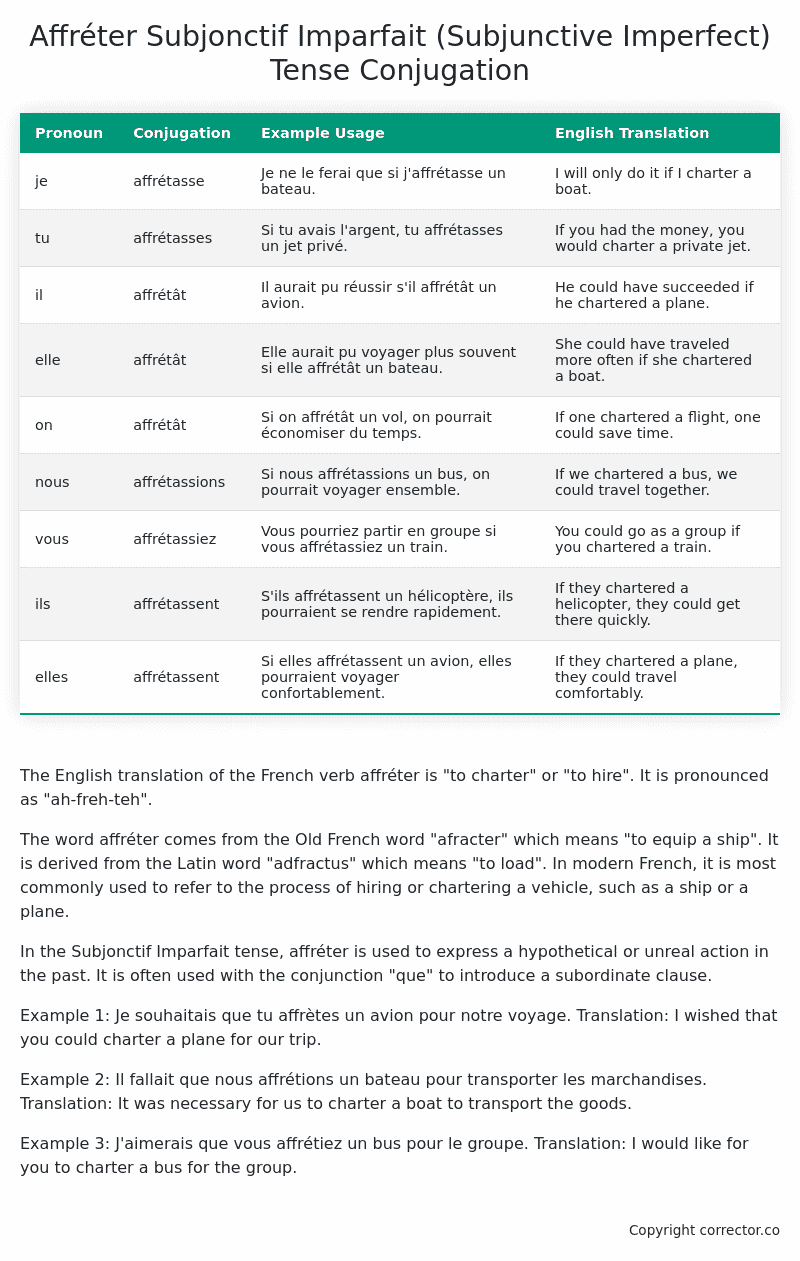Subjonctif Imparfait (Subjunctive Imperfect) Tense Conjugation of the French Verb affréter
Introduction to the verb affréter
The English translation of the French verb affréter is “to charter” or “to hire”. It is pronounced as “ah-freh-teh”.
The word affréter comes from the Old French word “afracter” which means “to equip a ship”. It is derived from the Latin word “adfractus” which means “to load”. In modern French, it is most commonly used to refer to the process of hiring or chartering a vehicle, such as a ship or a plane.
In the Subjonctif Imparfait tense, affréter is used to express a hypothetical or unreal action in the past. It is often used with the conjunction “que” to introduce a subordinate clause.
Example 1: Je souhaitais que tu affrètes un avion pour notre voyage.
Translation: I wished that you could charter a plane for our trip.
Example 2: Il fallait que nous affrétions un bateau pour transporter les marchandises.
Translation: It was necessary for us to charter a boat to transport the goods.
Example 3: J’aimerais que vous affrétiez un bus pour le groupe.
Translation: I would like for you to charter a bus for the group.
Table of the Subjonctif Imparfait (Subjunctive Imperfect) Tense Conjugation of affréter
| Pronoun | Conjugation | Example Usage | English Translation |
|---|---|---|---|
| je | affrétasse | Je ne le ferai que si j’affrétasse un bateau. | I will only do it if I charter a boat. |
| tu | affrétasses | Si tu avais l’argent, tu affrétasses un jet privé. | If you had the money, you would charter a private jet. |
| il | affrétât | Il aurait pu réussir s’il affrétât un avion. | He could have succeeded if he chartered a plane. |
| elle | affrétât | Elle aurait pu voyager plus souvent si elle affrétât un bateau. | She could have traveled more often if she chartered a boat. |
| on | affrétât | Si on affrétât un vol, on pourrait économiser du temps. | If one chartered a flight, one could save time. |
| nous | affrétassions | Si nous affrétassions un bus, on pourrait voyager ensemble. | If we chartered a bus, we could travel together. |
| vous | affrétassiez | Vous pourriez partir en groupe si vous affrétassiez un train. | You could go as a group if you chartered a train. |
| ils | affrétassent | S’ils affrétassent un hélicoptère, ils pourraient se rendre rapidement. | If they chartered a helicopter, they could get there quickly. |
| elles | affrétassent | Si elles affrétassent un avion, elles pourraient voyager confortablement. | If they chartered a plane, they could travel comfortably. |
Other Conjugations for Affréter.
Le Present (Present Tense) Conjugation of the French Verb affréter
Imparfait (Imperfect) Tense Conjugation of the French Verb affréter
Passé Simple (Simple Past) Tense Conjugation of the French Verb affréter
Passé Composé (Present Perfect) Tense Conjugation of the French Verb affréter
Futur Simple (Simple Future) Tense Conjugation of the French Verb affréter
Futur Proche (Near Future) Tense Conjugation of the French Verb affréter
Plus-que-parfait (Pluperfect) Tense Conjugation of the French Verb affréter
Passé Antérieur (Past Anterior) Tense Conjugation of the French Verb affréter
Futur Antérieur (Future Anterior) Tense Conjugation of the French Verb affréter
Subjonctif Présent (Subjunctive Present) Tense Conjugation of the French Verb affréter
Subjonctif Passé (Subjunctive Past) Tense Conjugation of the French Verb affréter
Subjonctif Imparfait (Subjunctive Imperfect) Tense Conjugation of the French Verb affréter (this article)
Subjonctif Plus-que-parfait (Subjunctive Pluperfect) Tense Conjugation of the French Verb affréter
Conditionnel Présent (Conditional Present) Tense Conjugation of the French Verb affréter
Conditionnel Passé (Conditional Past) Tense Conjugation of the French Verb affréter
L’impératif Présent (Imperative Present) Tense Conjugation of the French Verb affréter
L’infinitif Présent (Infinitive Present) Tense Conjugation of the French Verb affréter
Struggling with French verbs or the language in general? Why not use our free French Grammar Checker – no registration required!
Get a FREE Download Study Sheet of this Conjugation 🔥
Simply right click the image below, click “save image” and get your free reference for the affréter Subjonctif Imparfait tense conjugation!

Affréter – About the French Subjonctif Imparfait (Subjunctive Imperfect) Tense
Formation
Common Everyday Usage Patterns
Interactions with Other Tenses
Subjonctif Présent
Indicatif Passé Composé
Conditional
Conditional Perfect
Summary
I hope you enjoyed this article on the verb affréter. Still in a learning mood? Check out another TOTALLY random French verb conjugation!


